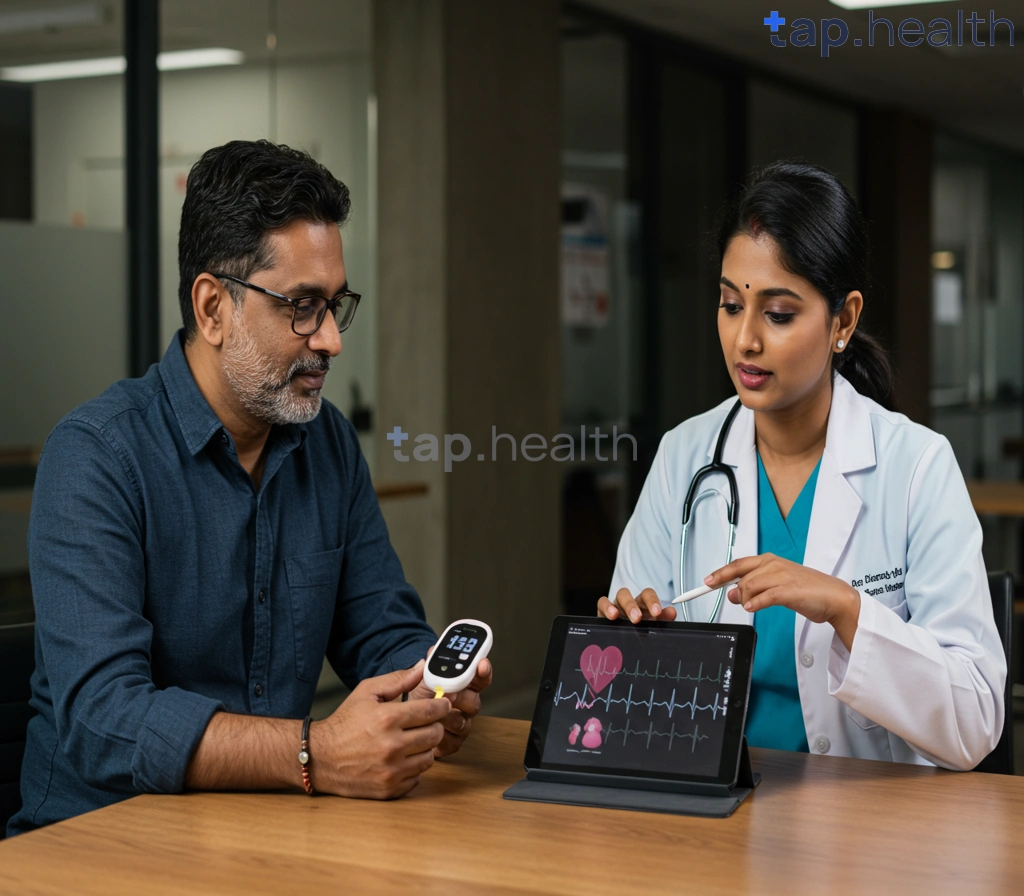Table of Contents
- Understanding Your Diabetes: Heart Health Matters
- Voice Your Concerns: Open Communication in Diabetes Care
- Diabetes Management: A Guide to Prioritizing Heart Health
- Heart and Diabetes: Recognizing the Connection and Taking Control
- Protecting Your Heart: Essential Steps for Diabetes Management
- Frequently Asked Questions
- References
Living with diabetes can feel like navigating a complex maze, but mastering self-management is key to a healthier, happier life. One of the most crucial aspects often overlooked is Understanding the Heart and Voice in Diabetes Management. This means truly listening to your body – both the physical signals your heart sends (blood pressure, fatigue) and the intuitive voice that guides your choices around food, activity, and medication. This blog post will explore how paying attention to these vital cues can significantly improve your diabetes control and overall well-being. Let’s dive in and uncover the secrets to better diabetes management together!
Understanding Your Diabetes: Heart Health Matters
Diabetes significantly increases your risk of heart disease, a critical concern, especially in India and other tropical countries. This is a silent threat, often overlooked amidst managing blood sugar levels. The stark reality is that a large portion of the diabetic population, 61% of those aged between 20-64 and 39% of those 65+, according to the International Diabetes Federation, are vulnerable. This highlights the urgent need to prioritize cardiovascular health alongside glycemic control.
Protecting Your Heart: Practical Steps
Many factors contribute to heart disease in individuals with diabetes. High blood pressure, high cholesterol, and unhealthy lifestyle choices significantly impact cardiovascular health. In tropical regions like India, certain dietary habits and environmental factors can exacerbate these risks. Prioritizing a heart-healthy diet rich in fruits, vegetables, and whole grains is crucial. Regular physical activity, even a brisk 30-minute walk most days of the week, is essential. Furthermore, managing stress and quitting smoking are vital steps towards preventing heart complications. For more specific steps you can take, check out Protect Your Heart from Diabetes: 5 Essential Steps.
Seeking Expert Guidance
Regular check-ups with your doctor are paramount. Early detection and management of cardiovascular risk factors are key to preventing heart disease. Discuss your concerns with your physician, especially if you have a family history of heart problems. In India and other tropical countries, access to quality healthcare can vary. Make sure you actively seek out qualified healthcare professionals and utilize available resources to support your diabetes management and heart health journey. Remember, taking proactive steps today ensures a healthier tomorrow. As you age, managing diabetes can present unique challenges. For advice on this, see Managing Diabetes as You Age: Challenges and Solutions.
Voice Your Concerns: Open Communication in Diabetes Care
The Importance of Open Dialogue in Diabetes Management
Managing diabetes effectively in India and other tropical countries requires more than just medication; it demands open and honest communication. The staggering statistic that 50% of diabetes cases worldwide remain undiagnosed, as highlighted by the International Diabetes Federation, underscores the critical need for better communication between patients and healthcare providers. This is particularly relevant in regions where access to healthcare might be limited or where cultural factors influence the willingness to discuss health concerns.
Breaking Down Barriers to Effective Communication
In many Indian and tropical communities, discussing health issues can be stigmatized or viewed as a personal weakness. This can prevent individuals from seeking early diagnosis and treatment, leading to complications. Open communication involves not only expressing concerns about symptoms like increased thirst, frequent urination, or unexplained weight loss but also actively participating in treatment decisions. This includes asking questions about medications, lifestyle modifications, and potential side effects. Patients must feel empowered to voice their needs and anxieties, fostering a collaborative relationship with their healthcare team. Learning more about Personalized Diabetes Control can significantly improve this collaboration.
Practical Steps for Improved Communication
To facilitate better communication, consider preparing a list of questions before your appointment. Bring a family member or friend for support and to help relay information. Don’t hesitate to seek second opinions if you’re unsure or uncomfortable. For those in rural areas with limited access, exploring telehealth options and community support groups can greatly improve access to information and emotional support. Remember, proactive communication is crucial for effective diabetes management and a healthier future. Improving your understanding through Diabetes Education can empower you to take control of your health.
Diabetes Management: A Guide to Prioritizing Heart Health
Maintaining healthy blood pressure is crucial for individuals with diabetes, especially in hot and humid climates prevalent across India and tropical countries. High blood pressure, or hypertension, significantly increases the risk of heart disease, stroke, and kidney complications—all major concerns for people with diabetes. For people with diabetes, the target blood pressure is generally below 140/90 mmHg, though some guidelines recommend aiming for below 130/80 mmHg. Achieving and maintaining these levels is paramount.
Understanding the Risks
The interplay between diabetes and hypertension is complex. High blood sugar damages blood vessels, increasing blood pressure and the risk of cardiovascular events. The heat and humidity in many Indian and tropical regions can further exacerbate these issues, potentially leading to dehydration and increased blood pressure. Lifestyle modifications become even more critical in these environments.
Practical Steps for Blood Pressure Management
Managing blood pressure effectively requires a multifaceted approach: a balanced diet low in sodium and saturated fats is crucial. Regular physical activity, even moderate exercise like brisk walking, is essential. Staying hydrated is particularly important in tropical climates. Regular monitoring of blood pressure at home and during doctor visits is vital. Consult your doctor about appropriate medication if lifestyle changes alone are insufficient to manage blood pressure levels.
Seeking Expert Advice
Remember, effective diabetes and hypertension management requires personalized care. Consult with your doctor or a certified diabetes educator to create a tailored plan specific to your needs and the climate you live in. They can help you determine your ideal blood pressure target and recommend appropriate lifestyle adjustments and medication, if necessary. Don’t delay seeking professional help; proactive management can significantly improve your long-term health and well-being. For more comprehensive tips on managing your diabetes, check out our guide: 10 Proven Tips to Effectively Manage Diabetes | Simple Guide. Learning to effectively manage your blood sugar is key, and this guide, 10 Proven Tips for Effective Diabetes Management, offers practical strategies.
Heart and Diabetes: Recognizing the Connection and Taking Control
Women in India and across tropical countries face a significant challenge: a heightened risk of heart disease due to diabetes. Research shows women with diabetes have a 40% higher risk of heart disease compared to men with diabetes. This alarming statistic underscores the critical need for proactive management of both conditions. Understanding this connection is the first step towards better health outcomes.
Understanding the Link Between Diabetes and Heart Disease
Diabetes significantly increases the risk of cardiovascular complications. High blood sugar damages blood vessels over time, leading to atherosclerosis (hardening of the arteries). This process restricts blood flow, increasing the likelihood of heart attacks, strokes, and other heart-related issues. In tropical climates, where lifestyle factors like diet and physical activity can be particularly influential, the risk is further amplified. This risk is compounded by other factors, such as obesity, which is closely linked to diabetes. For more information on this connection, see our blog on Understanding the Link Between Diabetes and Obesity.
Taking Control: Practical Steps for Indian and Tropical Women
Managing diabetes effectively is crucial for reducing heart disease risk. This involves a multifaceted approach encompassing healthy dietary choices, regular exercise, and consistent medication adherence as prescribed by your doctor. Prioritizing whole grains, fruits, and vegetables, while limiting processed foods, sugar, and unhealthy fats, is essential. Regular physical activity, even short walks, helps improve insulin sensitivity and cardiovascular health. Managing cholesterol is also vital, as explained in our article, How to Manage Cholesterol Levels with Diabetes?.
Seeking Support and Resources
Connecting with healthcare providers and support groups is vital. Many organizations in India and other tropical countries offer diabetes education programs and resources specifically tailored to women’s needs. Don’t hesitate to seek guidance and support; proactive management can significantly improve your heart health and quality of life. Taking charge of your health is the most powerful step you can take.
Protecting Your Heart: Essential Steps for Diabetes Management
Diabetes significantly increases your risk of heart disease, a leading cause of death globally, especially in regions like India and other tropical countries. The connection is undeniable: research shows that smokers with diabetes face a doubled mortality rate due to cardiovascular issues. This underscores the critical need for proactive heart health management if you have diabetes.
Lifestyle Changes for a Healthier Heart
Managing blood sugar levels is paramount. Consistent monitoring and adherence to your prescribed medication plan are crucial. This includes careful attention to diet, focusing on fresh fruits, vegetables, and whole grains common in Indian and tropical cuisines. Regular physical activity is equally vital; aim for at least 30 minutes of moderate-intensity exercise most days of the week. Even simple activities like walking, yoga, or cycling can make a substantial difference. Remember to consult your doctor before starting any new exercise regime.
Addressing Risk Factors
Beyond blood sugar control, other risk factors need addressing. If you smoke, quitting is one of the most impactful steps you can take. Smoking significantly exacerbates cardiovascular complications in people with diabetes. Similarly, maintaining a healthy weight and managing blood pressure and cholesterol levels are essential. Regular check-ups with your doctor are vital to monitor these factors and adjust your treatment plan as needed. For more information on preventing long-term complications, check out our article on How to Prevent Long-Term Complications of Diabetes: Easy Tips.
Seeking Support in Your Community
In India and other tropical countries, access to quality healthcare can vary. Seek support from local diabetes clinics or community health programs. Many organizations offer education and support groups, providing valuable resources and peer-to-peer interaction for managing diabetes effectively and protecting your heart. Take control of your health today; your heart will thank you. Remember that managing diabetes also involves protecting your vision; learn more in our guide on How to Protect Your Vision with Diabetes: Essential Eye Care Tips.
Frequently Asked Questions on Understanding the Heart and Voice in Diabetes Management
Q1. How does diabetes increase my risk of heart disease?
Diabetes significantly raises your chances of developing heart disease, especially in tropical areas like India. This is because diabetes affects blood vessels and increases other heart disease risk factors.
Q2. What lifestyle changes can I make to protect my heart if I have diabetes?
Focus on a heart-healthy diet, regular exercise, stress management techniques, and quitting smoking. These lifestyle changes are crucial for managing cardiovascular risks.
Q3. How often should I have check-ups if I have diabetes?
Regular check-ups are vital for early detection and management of cardiovascular issues. Your doctor can advise on the appropriate frequency based on your individual needs.
Q4. What if I’m a woman with diabetes? Are my risks different?
For women with diabetes, the risk of heart disease is even higher. Proactive management through lifestyle changes and regular check-ups is particularly important.
Q5. What resources are available to help me manage diabetes and protect my heart?
Many resources can help, including telehealth services, support groups, and open communication with your healthcare provider. These provide information, emotional support, and assistance in making informed treatment decisions.
References
- A Practical Guide to Integrated Type 2 Diabetes Care: https://www.hse.ie/eng/services/list/2/primarycare/east-coast-diabetes-service/management-of-type-2-diabetes/diabetes-and-pregnancy/icgp-guide-to-integrated-type-2.pdf
- Diagnosis and Management of Type 2 Diabetes: https://apps.who.int/iris/rest/bitstreams/1274478/retrieve




